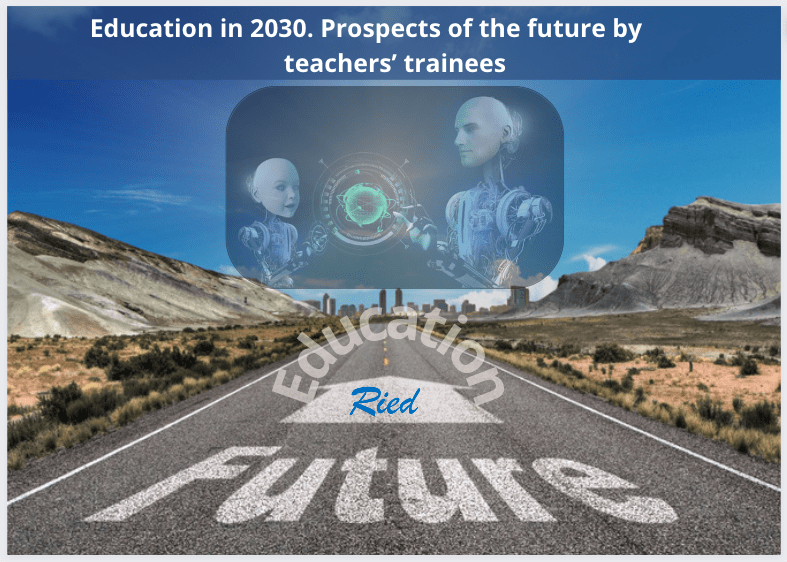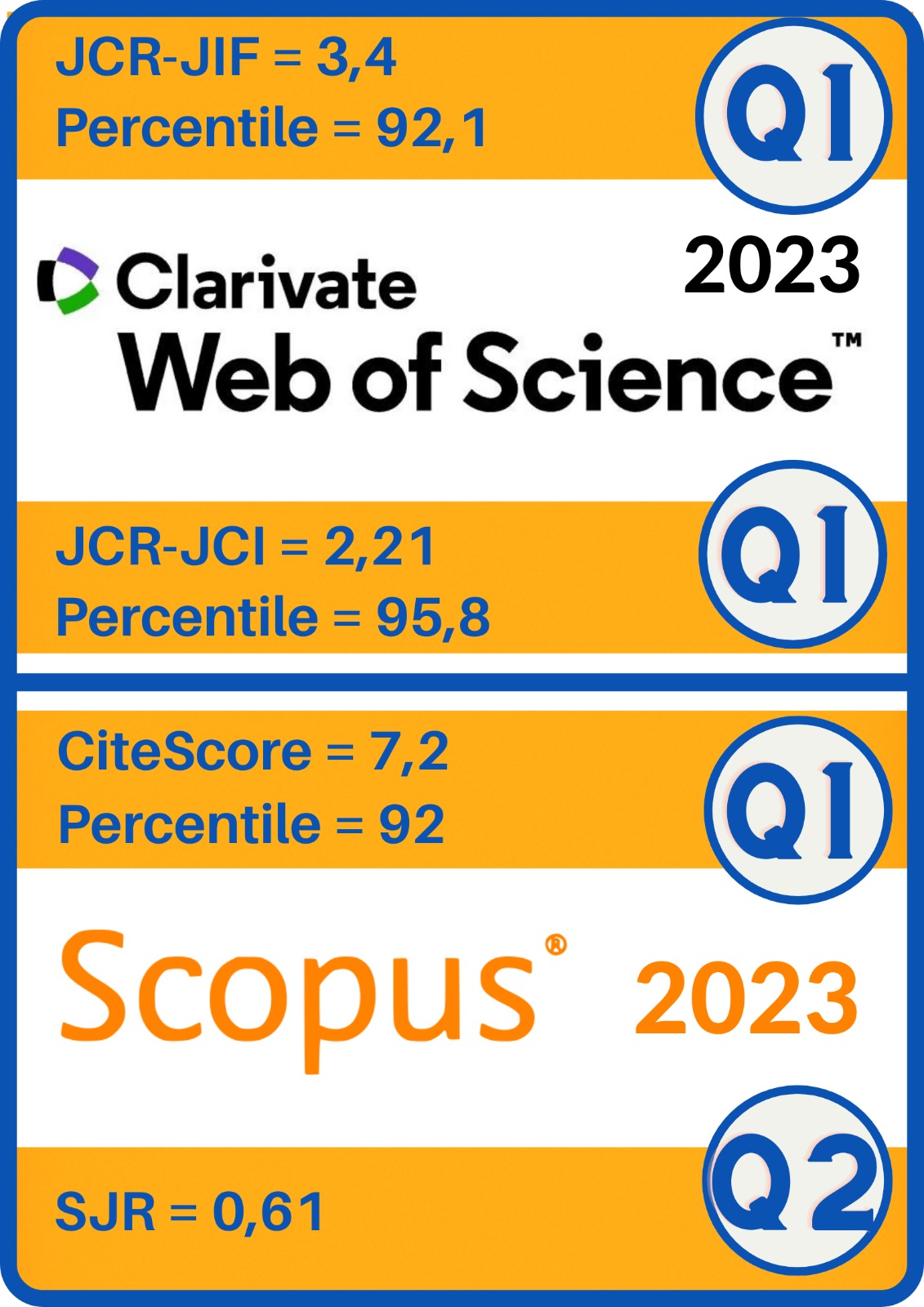Education in 2030. Prospects of the future by teachers’ trainees
DOI:
https://doi.org/10.5944/ried.27.1.37987Keywords:
educational trends, futures (of society), science fiction, creative writing, masters degrees, educational technologyAbstract
This study analyses 389 science-fiction stories about the future of education, written by students of the Teacher Training and Research in Education Master’s Degrees at the University of Alicante between the academic years 2009-2010 and 2019-2020. These stories were written as part of an assignment called “Education in 2030”, and they are available on our open-access course blogs. Our project employs a mixed-research approach and the analyses include both quantitative and qualitative aspects through descriptive statistics in a longitudinal study. According to the results, the stories are classified into two main categories: Positive Predictions and Negative Predictions, the latter being more prominent (52.94% of total), closely connected to dystopian science-fiction models. Within these two macro-categories, three main codes are established about Negative Predictions on one hand, namely Teacher-Learner, Learning process and System, and about Positive Predictions on the other hand: Teaching, Contents and Model. These codes structure the analysis branching into more sub-codes which also mark frequencies of occurrence of ideas and notions. We would like to highlight those codes that characterize the teacher figure as a “mediator” or “clandestine” as two recurrent educational models for the future. Excerpts from the analysed stories are included to illustrate the codes employed. The creation of educational stories within the science-fiction genre offers a rich, critical and comprehensive vision of the future. The stories analysed in this project portend significant changes in teaching practices and a new use of technology, but also show concern about potential dehumanisation in education and a growing distance between ideals and reality concerning work improvement, inclusion and sustainability.
FULL ARTICLE:
https://revistas.uned.es/index.php/ried/article/view/37987/28170
Downloads
References
Area-Moreira, M. (2020). La enseñanza semipresencial: mezclando lo presencial y lo virtual. In M. Turull (Ed.), Manual de docencia universitaria (pp. 259-269). Octaedro.
Area-Moreira, M., Bethencourt-Aguilar, A., & Martín-Gómez, S. (2020). De la enseñanza semipresencial a la enseñanza online en tiempos de Covid19. Visiones del alumnado. Campus Virtuales, 9(2), 35-50. https://bit.ly/3JV24Uc
Aziz, A. (2018). Education 4.0 made simple: ideas for teaching. International Journal of Education and Literacy Studies, 6(3), 92-98. https://doi.org/10.7575/aiac.ijels.v.6n.3p.92
Barnes, A. (2008). Future-wishing, magical fantasies, yet being “real”: Snapshots of student teachers perceptions during their initial training. Teacher Development: An International Journal of Teachers Professional Development, 12(1), 3-13. https://doi.org/10.1080/13664530701827715
Bowler, P. J. (2017). A history of the future: Prophets of progress from H. G. Wells to Isaac Asimov. Cambridge University Press. https://doi.org/10.1017/9781316563045
Branda, S. A., & Porta, L. G. (2019). Historias escolares y relatos de estudiantes del Profesorado de Inglés: Amor por la docencia. Rev. Actual. Investigación Educativa, 19(3). https://doi.org/10.15517/aie.v19i3.38622
Briggs, R. (2013). The future of prediction: speculating on William Gibson's meta-science-fiction. Textual Practice, 27(4), 671-693. https://doi.org/10.1080/0950236X.2012.738702
Burbules, N. C., Fan, G., & Repp, P. (2020). Five trends of education and technology in a sustainable future. Geography and sustainability, 1(2), 93-97. https://doi.org/10.1016/j.geosus.2020.05.001
Connelly, M., & Clandinin, J. (1990). Stories of experience and narrative inquiry. Educational Researcher, 19(5), 2-14. https://doi.org/10.3102/0013189X019005002
Fernández, M., Postigo, A., Pérez, L., & Alcaraz, N. (2022). Cómo hacer investigación cualitativa en el área de tecnología educativa. RiiTE. Revista interuniversitaria de investigación en Tecnología Educativa, 13, 93-116. https://doi.org/10.6018/riite.547251
Flick, U. (2015). El diseño de investigación cualitativa. Morata.
Flores-Vivar, J., & García-Peñalvo, F. J. (2023). Reflexiones sobre la ética, potencialidades y retos de la Inteligencia Artificial en el marco de la Educación de Calidad (ODS4). Comunicar, 74, 37-47. https://doi.org/10.3916/C74-2023-03
García Aretio, L. (2020). Bosque semántico: ¿educación/enseñanza/aprendizaje a distancia, virtual, en línea, digital, eLearning…? RIED-Revista Iberoamericana de Educación a Distancia, 23(1), 9-28. https://doi.org/10.5944/ried.23.1.25495
García Peñalvo, F. J., Llorens-Largo, F., & Vidal, J. (2024). La nueva realidad de la educación ante los avances de la inteligencia artificial generativa. RIED-Revista Iberoamericana de Educación a Distancia, 27(1). https://doi.org/10.5944/ried.27.1.37716
García-Ruiz, R., Buenestado-Fernández, M., & Ramírez-Montoya, M. S. (2023). Evaluación de la Competencia Digital Docente: instrumentos, resultados y propuestas. Revisión sistemática de literatura. Educación XX1, 26(1), 273-301. https://doi.org/10.5944/educxx1.33520
García-Única, J. (2017). Ecocrítica, ecologismo y educación literaria: una relación problemática. Revista interuniversitaria de formación del profesorado, 31(3), 79-90.
Gidley, J. M. (2017). The future: A very short introduction. Oxford University Press. https://doi.org/10.1093/actrade/9780198735281.001.0001
Ingerflom, C. S. (2019). Entre el mañana y el ayer ¿Cómo pensar y enseñar los cambios? En A. Kozel, M. Bergel & V. Llobet (Eds.), El futuro: miradas desde las Humanidades (pp. 40-51). Unsam Edita.
Keser, H., & Semerci, A. (2019). Technology trends, Education 4.0 and beyond. Contemporary Educational Researches Journal, 9(3), 39–49. https://doi.org/10.18844/cerj.v9i3.4269
Kozel, A., Bergel M., & Llobet, V. (Eds.) (2019). El futuro: miradas desde las Humanidades. Unsam Edita.
Kurzweil, R. (2015). La singularidad está cerca: Cuando los humanos transcendamos la biología. Lola Books.
Londoño Monroy, G. (2012). Aprendiendo en el aula. Contando y haciendo relatos digitales personales. Digital Education Review, 22, 19-36.
Mahida, C. A. (2011). Dystopian future in contemporary science fiction. Golden Research Thought, 1(1).
Marcelo, C., & Vaillant, D. (2018). Hacia una formación disruptiva de docentes: 10 claves para el cambio. Narcea.
Marimon-Martí, M., Romeu-Fontanillas, T., Ojando-Pons, E. S., & Esteve-González, V. (2022). Competencia Digital Docente: autopercepción en estudiantes de educación. Pixel-Bit. Revista de Medios y Educación, 65, 275-303. https://doi.org/10.12795/pixelbit.93208
Martínez Mesa, F. (2016). Utopía y distopía: apuntes sobre una misma realidad. In E. Encabo Fernández, M. Urraco Solanilla, & A. Martos García (Eds.), Sagas, distopías y transmedia. Ensayos sobre ficción fantástica (pp. 197-214). Marcial Pons.
Mesa Rave, N., Gómez Marín, A., & Arango Vásquez, S. I. (2023). Escenarios colaborativos de enseñanza-aprendizaje mediados por tecnología para propiciar interacciones comunicativas en la educación superior. RIED-Revista Iberoamericana de Educación a Distancia, 26(2), 259-282. https://doi.org/10.5944/ried.26.2.36241
Molas-Castells, N., Fuertes-Alpiste, M., Quintana Albalat, J., & Herreros Navarro, M. (2022). Publicaciones en medios sociales de adolescentes y jóvenes: implicaciones para las actividades de creación de Relatos Digitales Personales. Revista de Educación a Distancia (RED), 22(70). https://doi.org/10.6018/red.524161
Nurmilaakso, M. (2009). Preschool and Primary school children as learners in 2030: Views of Finnish student teachers. Journal of Teacher Education for Sustainability, 11(1), 75-85. https://doi.org/10.2478/v10099-009-0034-1
Ortiz Jiménez. L., & Carrión Martínez, J. J. (Coords.). (2020). Educación inclusiva: Abriendo puertas al futuro. Dykinson. https://doi.org/10.2307/j.ctv153k3m3
Parreira, A., Lehmann, L., & Oliveira, M. (2021). O desafio das tecnologias de inteligência artificial na Educação: percepção e avaliação dos professores. Ensaio: Avaliação e Políticas Públicas em Educação, 29(113), 975-999. https://doi.org/10.1590/s0104-40362020002803115
Pogue, D. (2014). Future imperfect. Scientific American, 310(3). https://doi.org/10.1038/scientificamerican0314-36
Pogue D. (2017). How good is Star Trek's record at predicting the future of tech? Scientific American. https://bit.ly/3BUXQcy
Prosser, M. (2019). Why companies and armies are hiring science fiction writers. Singularity Hub. https://bit.ly/3Qz6XsX
Rovira-Collado, J. (2020a). ¿Sueñan los lectores con naves voladoras? Lectura y Educación del futuro. In M. P. Martínez, F. Mateu, & M. Herrero-Herrero (Eds.), Space fiction. Visiones de lo cósmico en la ciencia ficción (pp. 201-210). Cinestesia.
Rovira-Collado, J. (2020b). Hacia una didáctica de la lengua y la literatura 4.0. In R. Roig-Vila & J. M. Antolí-Martínez (Eds.), Claves y retos en torno a nuevos contextos educativos (pp. 207-232). Palas Atenea.
Rovira-Collado, J., Martínez-Carratalá, F. A., Miras, S., & Ribes-Lafoz, M. (2022). Teaching Stories from the future: Technology for the Language and Literature Classroom. In S. Mangual Andrés & M. Urrea Solano (Eds.), Education and the Collective Construction of Knowledge (pp. 173-187). Peter Lang.
Stableford, B. M. (2006). Science fact and science fiction: An encyclopedia. Routledge. https://doi.org/10.4324/9780203943588
Suárez Ramírez, S., Fernández Guerrero, M., Suárez Ramírez, M., & Suárez Muñoz, Á. (2016). Distopía y educación: hacia una docencia sin profesor o el peligro de la virtualidad y la pérdida de referentes socioculturales o el menoscabo de valores. In E. Encabo Fernández, M. Urraco Solanilla, & A. Martos García (Eds.), Sagas, distopías y transmedia. Ensayos sobre ficción fantástica (pp. 369-376). Marcial Pons.
Thomson, A. J. (1996). Asimov's psychohistory: Vision of the future or present reality? AI Applications, 10(3), 1-8.
UNESCO. (2023). Global Education Monitoring Report 2023: Technology in education – A tool on whose terms? Ref. 10.54676/UZQV8501. https://unesdoc.unesco.org/ark:/48223/pf0000385723
Westfahl, G., & Yuen, W. K. (Eds.). (2014). Science fiction and the prediction of the future: Essays on foresight and fallacy (Vol. 27). McFarland.
Wit, H. D., & Altbach, P. G (2021). Internationalization in higher education: global trends and recommendations for its future. Policy Reviews in Higher Education, 5(1), 28-46. https://doi.org/10.1080/23322969.2020.1820898

Downloads
Published
How to Cite
Issue
Section
License
Copyright (c) 2023 José Rovira-Collado, Francisco Antonio Martínez-Carratalá, Sebastián Miras

This work is licensed under a Creative Commons Attribution 4.0 International License.
The articles that are published in this journal are subject to the following terms:
1. The authors grant the exploitation rights of the work accepted for publication to RIED, guarantee to the journal the right to be the first publication of research understaken and permit the journal to distribute the work published under the license indicated in point 2.
2. The articles are published in the electronic edition of the journal under a Creative Commons Attribution 4.0 International (CC BY 4.0) license. You can copy and redistribute the material in any medium or format, adapt, remix, transform, and build upon the material for any purpose, even commercially. You must give appropriate credit, provide a link to the license, and indicate if changes were made. You may do so in any reasonable manner, but not in any way that suggests the licensor endorses you or your use.
3. Conditions for self-archiving. Authors are encouraged to disseminate electronically the OnlineFirst version (assessed version and accepted for publication) of its articles before publication, always with reference to its publication by RIED, favoring its circulation and dissemination earlier and with this a possible increase in its citation and reach among the academic community.







